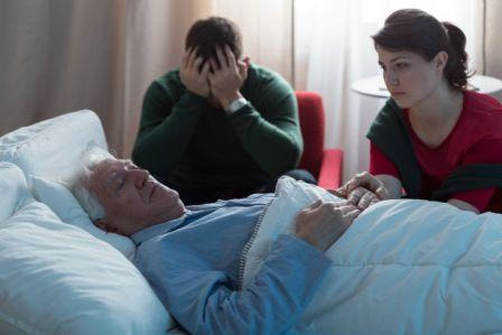Hospice Care
|
Hospice care provides medical services, emotional support, and spiritual resources for people who are in the last stages of a serious illness, such as cancer or heart failure. Hospice care focuses on comfort and quality of life, rather than cure. Hospice care also helps family members manage the practical details and emotional challenges of caring for a dying loved one. Hospice care affirms life and views death as a natural process.
Hospice care is appropriate for those who have a limited prognosis of 12 months or less. Some people think that starting hospice is a last resort that it means they're giving up on life. Some think that hospice means a lower level of medical care, but hospice is simply a type of care that focuses on the quality of your life instead of continuing with treatment to prolong your life. |
Services Provided From Hospice Care
Hospice services usually include:
All hospice care facilities must provide certain services, but they tend to have different approaches to service, staffing patterns, and types of support services offered.
Hospice services usually include:
- Basic medical care with a focus on pain and symptom control.
- Access to a member of your hospice team 24 hours a day, 7 days a week.
- Medical supplies and equipment as needed.
- Counseling and social support to help you and your family with psychological, emotional, and spiritual issues.
- Guidance with the difficult, but normal issues of life completion and closure.
- A break (respite care) for caregivers, family, and others who regularly care for you
- Volunteer support, such as preparing meals and running errands.
- Counseling and support for your loved ones after death.
All hospice care facilities must provide certain services, but they tend to have different approaches to service, staffing patterns, and types of support services offered.
Cost of Hospice Care
Hospice coverage is provided by Medicare, Medicaid and by most private health insurance policies. Medicare and/or Medicaid are the most frequent sources of payment. Both will pay at 100% for medication relating to the terminal diagnosis, equipment needed for comfort and safety (hospital bed, bedside commode and wheelchair, etc) and the services of the Hospice care team.
Medicare Part A will cover hospice care for Medicare-eligible people who are terminally ill and have life expectancies of six months or less. Hospice care under Medicare includes both at-home and inpatient care and focuses on providing comfort and relief from pain.
Hospice coverage is provided by Medicare, Medicaid and by most private health insurance policies. Medicare and/or Medicaid are the most frequent sources of payment. Both will pay at 100% for medication relating to the terminal diagnosis, equipment needed for comfort and safety (hospital bed, bedside commode and wheelchair, etc) and the services of the Hospice care team.
Medicare Part A will cover hospice care for Medicare-eligible people who are terminally ill and have life expectancies of six months or less. Hospice care under Medicare includes both at-home and inpatient care and focuses on providing comfort and relief from pain.
To be eligible, a doctor must certify that the patient is terminally ill, and the patient must choose hospice care instead of other Medicare benefits. The patient must receive care from a Medicare approved hospice program either at home or in a certified hospice. The full cost of physician and nursing services, medical appliances, and supplies are paid by Medicare for up to 210 days (although some patients can be re-certified for a longer period of benefits).
Medicare’s hospice benefit helps cover the financial cost of a terminal illness. Hospice care is available 24 hours a day, 7 days a week.
Although not a solution to planning for long-term care needs, Medicare’s hospice benefit may help individuals and families cope with the emotional trauma and financial cost of a terminal illness. Family or friends serving as primary caregivers in the home can call for hospice help 24 hours a day, seven days a week.
Medicare’s hospice benefit helps cover the financial cost of a terminal illness. Hospice care is available 24 hours a day, 7 days a week.
Although not a solution to planning for long-term care needs, Medicare’s hospice benefit may help individuals and families cope with the emotional trauma and financial cost of a terminal illness. Family or friends serving as primary caregivers in the home can call for hospice help 24 hours a day, seven days a week.


